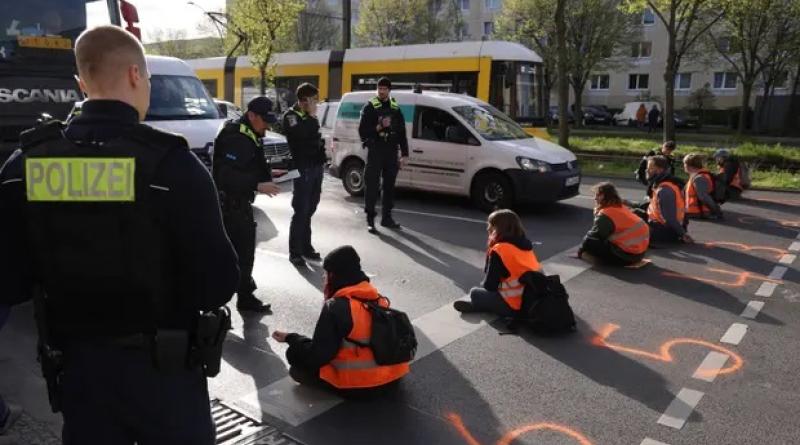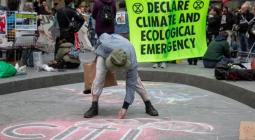German police union boss calls for crackdown on growing climate protests

Police representatives, members of the judiciary and politicians in Germany are calling for harsher penalties for climate activists, including preventive detention and longer prison terms, in an effort to halt their disruptive protests.
This week has seen the most intense protests yet by the campaign group Letzte Generation (Last Generation), with hundreds of its members blocking scores of roads during rush hour in Berlin.
Rainer Wendt, the head of a police trade union, the Deutsche Polizeigewerkschaft, led the calls for what he called the “Bavarian model” to be rolled out across the country. In the southern state, activists can be placed in preventive detention for up to 30 days in anticipation of their participation in a blockade.
In Berlin, the maximum preventive detention is currently 48 hours. “It is no accident that activists have chosen to centre their protests on Berlin and not on Munich [the capital of Bavaria],” Wendt told the news network RND.
He said the penalties in Berlin were too mild. “I consider this to be way too little … We will only get this situation under control if the punishments are harsher.”
Benjamin Jendro, of the Berlin police, said that as the protests had increased in number, alternative ways of controlling them were necessary. “We don’t want Bavarian-type rules, but we would like to have more ability to get to grips with the protests,” he told Welt TV.
Germany’s interior minister, Nancy Faeser, of the Social Democrats, has urged the 16 states to come together to create a unified stance on preventive detention.
It has been more than a year since Letzte Generation started its protests, which have mainly involved sit-ins in front of traffic, and activists sticking themselves to the road. The actions have earned them the nickname Klimakleber or “climate stickers”.
Other protests have included throwing mashed potato at works of art in galleries, lopping off the top of a municipal Christmas tree, turning off a gas pipeline, throwing fake oil at the German constitution, spraying paint on political party headquarters, and cutting through the perimeter fence of Berlin airport.
The group has repeatedly said its main aim is to highlight how imminent a climate catastrophe is, and to press the government for more urgent action, in particular to stop the use of fossil fuels.
It wants to see the establishment of a people’s council, made up of 150 Germans representing every level of society, who would create realistic ideas to tackle the emergency and present them to parliament. It also wants the government to introduce a 130kmh (80mph) speed limit on motorways.
Letzte Generation points to recent surveys in which four-fifths of Germans have called for the government to take more and swifter action on the climate emergency.
Initially, penalties against participants in the protests included cautions or fines. But German courts have started to raise the stakes in recent weeks, imposing prison sentences on some campaigners.
On Wednesday, a woman identified as Maija W, who has been a participant in Letzte Generation actions for more than a year and who last August glued herself to the frame of an oil painting by Lucas Cranach in Berlin’s Gemäldegalerie, was sentenced to four months in prison without probation.
The judge, Susanna Wortmann, said: “It is not acceptable that parts of society make reference to their objectives as the reason for breaking the law.” She said a suspended sentence was out of the question because the woman had shown “intransigence” and said she intended to take part in future protests, so that “there is no positive social prognosis”.
The woman, a 24-year-old design graduate, told the court that her protest had been symbolic and she and her fellow protester knew the painting would not be damaged as it was protected behind glass. “My participation in these actions isn’t frivolous or impetuous,” she said, adding that it was meant to throw light on the threat posed by inaction on the climate.
Earlier this month, three other protesters were sentenced to several months each in jail in Heilbronn for halting traffic. The judge, Julia Schmitt, accused the participants of coercion, for which she could have given a sentence of up to three years.
Critics have drawn comparisons between the sentences handed down to Letzte Generation and myriad far milder penalties given for traffic accidents caused by careless driving in which people have died.
The group has repeatedly said its main aim is to highlight how imminent a climate catastrophe is, and to press the government for more urgent action, in particular to stop the use of fossil fuels.
It wants to see the establishment of a people’s council, made up of 150 Germans representing every level of society, who would create realistic ideas to tackle the emergency and present them to parliament. It also wants the government to introduce a 130kmh (80mph) speed limit on motorways.
Letzte Generation points to recent surveys in which four-fifths of Germans have called for the government to take more and swifter action on the climate emergency.
Initially, penalties against participants in the protests included cautions or fines. But German courts have started to raise the stakes in recent weeks, imposing prison sentences on some campaigners.
On Wednesday, a woman identified as Maija W, who has been a participant in Letzte Generation actions for more than a year and who last August glued herself to the frame of an oil painting by Lucas Cranach in Berlin’s Gemäldegalerie, was sentenced to four months in prison without probation.
The judge, Susanna Wortmann, said: “It is not acceptable that parts of society make reference to their objectives as the reason for breaking the law.” She said a suspended sentence was out of the question because the woman had shown “intransigence” and said she intended to take part in future protests, so that “there is no positive social prognosis”.
The woman, a 24-year-old design graduate, told the court that her protest had been symbolic and she and her fellow protester knew the painting would not be damaged as it was protected behind glass. “My participation in these actions isn’t frivolous or impetuous,” she said, adding that it was meant to throw light on the threat posed by inaction on the climate.
Earlier this month, three other protesters were sentenced to several months each in jail in Heilbronn for halting traffic. The judge, Julia Schmitt, accused the participants of coercion, for which she could have given a sentence of up to three years.
Critics have drawn comparisons between the sentences handed down to Letzte Generation and myriad far milder penalties given for traffic accidents caused by careless driving in which people have died.
cover photo: Letzte Generation activists block traffic on a road in Berlin on Wednesday. Photograph: Sean Gallup/Getty Images




